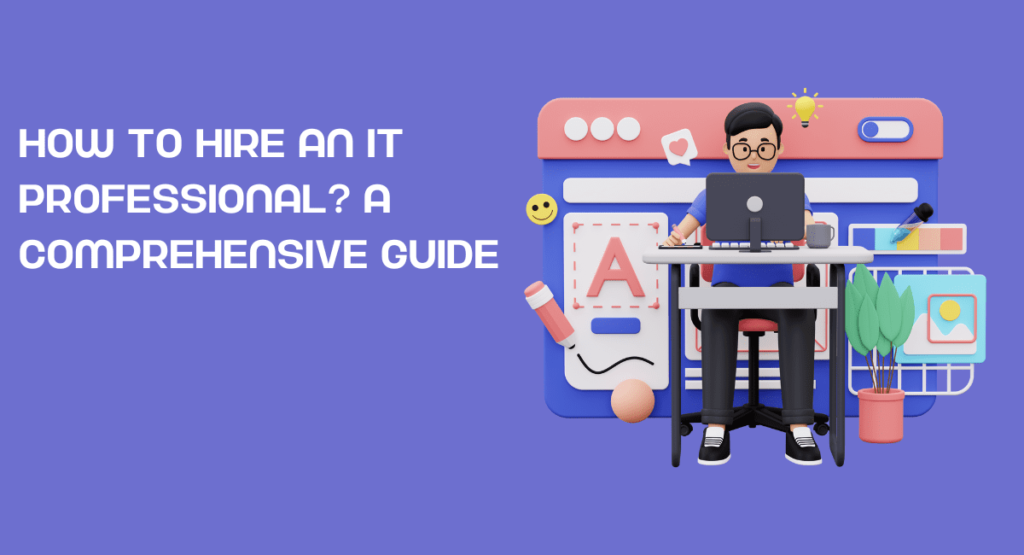How to Hire an IT Professional? A Comprehensive Guide


Are your business having trouble keeping up with the ever-changing technology landscape? Is your business struggling to keep up with the competition? If your answer is yes, it might be time to hire an IT professional.
But how do you go about finding the best candidate for the job? A comprehensive guide will walk you through the entire process of hiring an IT professional.
We’ll discuss what to look for in a candidate, how to assess their skills, and what questions you need to ask during the interview process. Let’s get started!
Why hire an IT professional?
“The role of information technology, or IT, is integral to implementing and maintaining the infrastructure and solutions that will continue to move businesses forward.” LinkedIn Talent Solutions.
An IT professional helps your business grow by helping you manage and protect your data and creating and implementing technology solutions that will improve efficiency and productivity.
Additionally, an IT professional can help you to save money on your technology expenses to achieve your business objectives.
How to hire a professional in the IT industry?

You’ll need to take some steps when you are looking to hire an IT professional:
- Define the job role and responsibilities.
- Write a detailed job description.
- Post the job on relevant job boards and websites.
- Review resumes and applications.
- Conduct initial phone or video interviews.
- Invite candidates for in-person interviews.
- Ask the right questions during the interview process.
- Make a job offer to your selected
Job roles of an IT professional or the job description
The job description for an IT professional job posting should include:
1. A job summary, including its purpose, duties, and responsibilities.
2. A statement describing the essential job skills and knowledge necessary to perform well.
3. Key performance indicators (KPI) or goals related to company objectives.
4. Reasonable expectations for advancement opportunities within its careers.
An IT professional or IT specialist typically has one or more of the following job roles:
Systems administrator:
This individual is responsible for the overall operation of the computer systems within the organization. They install, configure and maintain the different operating systems and applications and may also be responsible for network administration.
Network engineers/administrator:
This individual is responsible for designing, implementing and maintaining the company’s computer networks, including their wide area networks.
Database administrator:
This individual is responsible for designing, implementing, data storage and maintaining the company’s database management systems.
Web developer:
This individual is responsible for developing and maintaining the company’s web presence. As web developers, they may also be responsible for developing e-commerce solutions.
IT manager:
This individual oversees all aspects of information technology within the organization. They develop and implement technology strategies and policies, manage budgets and personnel of the IT department, monitor managed service providers, and ensure that all systems run smoothly.
Computer Security Specialists:
Computer security specialists protect computer systems from attacks by viruses, malware, and hackers. They typically have experience in various areas of computer security, such as penetration testing, ethical hacking, and cryptography.
The job roles of an IT professional or job titles can vary depending on their level of experience and specialization.
When should you hire an IT professional?
The best time to hire an IT professional is when your business is growing, and you need someone to manage and protect your data, or when you want to implement new technology solutions.
Additionally, if you are struggling to keep up with the competition, hiring an IT professional can help you catch up and surpass your competitors.
What to look for when hiring an IT professional?

When hiring IT professionals, it is crucial to consider their technical skills and ability to communicate with clients and co-workers. You should ensure that the IT professional you are considering has the necessary skills.
Review their resume and job history to understand their experience and expertise. Then, take the time to interview candidates to see how well they would fit into your company culture.
Be sure to ask about their communications skills, as IT professionals need to be able to explain complex technical concepts in plain language. Finally, don’t forget to check references! A good IT professional will have plenty of satisfied clients who can vouch for their skills and abilities.
How to hire an IT professional?
It is essential to ensure the candidates have the necessary skills. Review their resume and job history to see their experience and expertise. Then, take the time to interview them to see if they are a good fit for your company culture.
1. Know what you need
Before you hire an IT professional, you need to know precisely what you need them to do. Are you having trouble with your computer and need someone to help troubleshoot? Or someone to manage the network? Be specific in what you want the person to do to find the best candidate for the job.
2. Do your research

Don’t just hire the first IT professional that comes along. Take the time to research different candidates and find someone who is a good fit for your business. Ask around for recommendations, read online reviews, and compare pricing before making a decision.
3. Screen candidates properly
Once you’ve found some potential candidates, screening them properly before hiring is important. Ask them questions about their experience, their skill set, and their approach to problem-solving. Make sure they are familiar with the programs and tools you use, so there is no confusion once they start working with you.
4. Set expectations from day one
Setting expectations from day one when hiring an IT professional is essential. Tell them what hours they can expect, what kind of projects they will be working on, and your expectations for their work. By doing this, you’ll avoid any misunderstandings down the road.
These steps will help you hire the best IT professional for your business. It would be best if you have focused on growing your business with the right person and left the technical stuff to them.
Hiring an IT professional can help your business grow by managing and protecting data, improving efficiency, and saving money on technology expenses.
When hiring IT professionals, look for someone with the necessary skills and a good fit for your company culture. Be sure to interview candidates, check references, and set expectations from day one.
Companies have to focus on growing their business with the right IT professional on their team.
Get more out of your business
Get the best employee engagement content every week via mailing list
The interview process

When hiring an IT professional, your business must undergo an interview process. The process helps you determine if the candidate is a good fit for your company. There are a few things you will want to keep in mind when interviewing IT professionals:
Experience:
When interviewing an IT professional, you will want to ask about their experience. Information includes the type of experience they have and the size of companies they have worked for. Find out by asking about the projects they have worked on.
Skills:
You will want to ask about the IT professional’s required skills. The skills include their technical skills as well as their soft skills.
Culture:
Ensuring the IT professional is a good fit for your company’s culture is essential. You will want to ask about their values and how they work best.
Questions to ask during the interview process

During the hiring process, you will meet candidates, evaluate their qualifications and try to get a sense of their personalities. The goal is to find the person who is not only technically qualified for the job but also is a good fit for your company’s culture. Here are some questions that you can ask during interviews to help you hire an IT professional:
- What led you to pursue a career in IT?
- What are some of the most significant challenges in your current role?
- What are the essential qualities that an IT professional should have?
- What motivates you to stay up-to-date with new technology?
- How do you handle difficult customer service situations?
- Can you share a project that you were particularly proud of?
- What do you do when you encounter a problem you don’t know how to solve?
- How do you handle stress and deadlines?
- What are your thoughts on teamwork in the IT field?
- Can you share a time when you went above and beyond for a customer or client?
These questions will help you hire an IT professional who is not only technically qualified but also fits your company culture. And you can understand the candidate’s personality and work style by asking these questions.
Below are standard questions for the IT candidates you can not miss:
- What experience do you have in the field?
- Do you have any certifications?
- What kind of software are you familiar with?
- Can you provide me with references?
- How could you resolve this problem?
- What is your availability?
- How much do you charge per hour/project?
The benefits of hiring an IT professional

Employers can reap many benefits when hiring an IT professional for their business. Perhaps the most crucial advantage is that an IT professional can help your business grow in several ways.
For example, an IT professional can help you develop and implement technology solutions to improve efficiency and productivity. Additionally, they help you protect your company’s data and network from cyber attacks, which can be costly and damaging to a business. Hiring an IT professional ensures your business has the best chance to thrive in today’s digital age.
How do I identify whether or not a candidate is a good fit for my organization?
Screening candidates for specific skills and qualifications are essential when hiring for your organization. Your first step should be to assess the candidate’s IT experience or related fields.
Next, you should try to identify their skills and experience. For example, are they experienced with Microsoft Office? Are they experienced with networking and computer systems? Do they have relevant certifications?
After assessing these factors, it’s also essential to ask whether the candidate is willing to relocate and work remotely. If the candidate has any ethical concerns about information security, it may be beneficial to inquire about those.
What common red flags indicate that a candidate will not be a good fit for my organization?

Some common red flags that indicate a candidate will not be a good fit for your organization include:
- Inappropriate behavior in online forums or social media channels
- Not being able to demonstrate a strong understanding of the company’s technology and systems
- Failing to meet industry standards for qualifications or experience
- Poor communication skills, lack of follow through, and not meeting deadlines.
In emerging technologies, it’s also important to be wary of those who claim to know everything. The ever-changing IT landscape means that no one can know everything, and anyone who claims otherwise is likely not being truthful.
Additionally, be sure to trust your gut instinct. If something about a candidate doesn’t feel right, it’s probably best to move on to someone else.
Hire an IT service provider or directly hire an IT professional

Just like any other employee, you must first consider the cost of hiring someone for your IT needs. For example, an IT professional salary ranges around $60,000 per year.
IT professionals require specialized training and education to handle your IT needs. As a result, hiring a new IT professional will cost you more than just paying the employee directly. It may also require you to pay for the training and education of this new employee.
Finally, you may consider directly hiring a professional IT service provider instead of an IT professional.
Conclusion
IT professionals are essential for businesses of all sizes, providing critical support and services. However, hiring an IT professional can be daunting, so it’s necessary to have a comprehensive guide on how to go about it.
We’ve informed you everything you need to know to choose the suitable IT professional for your business and interview them properly. We hope you get the best in hiring an IT professional!


